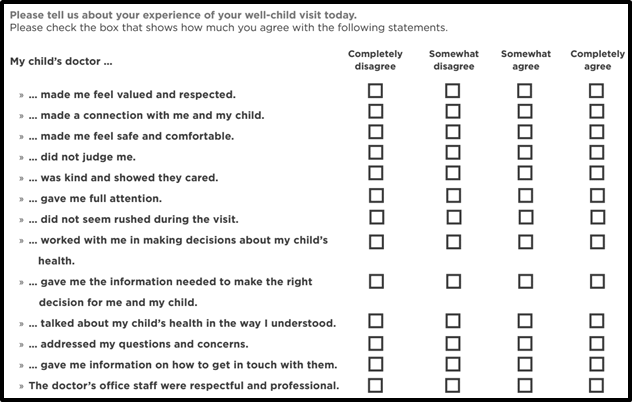General Pediatrics 2
Session: General Pediatrics 2
707 - Co-Designing a Measure of the Parent/Caregiver-Clinician Relationship: A Tool to Enhance Patient-Centered Pediatric Care
Friday, April 25, 2025
5:30pm - 7:45pm HST
Publication Number: 707.4297
Danielle Erkoboni, Childrens Hospital of Philadelphia, Blue Bell, PA, United States; Manya Bell, Institute for Child Success, Pawcatuck, CT, United States; Tyson Barker, Institute for Child Success, Eugene, OR, United States; Leah Gillen, Reach Out and Read, Somerville, MA, United States; Nikki Shearman, Reach Out and Read, Boston, MA, United States

Danielle C. Erkoboni, MD, MSHP (she/her/hers)
Assistant Professor of Clinical Pediatrics
Childrens Hospital of Philadelphia
Blue Bell, Pennsylvania, United States
Presenting Author(s)
Background: For a parent/caregiver, a strong relationship with a pediatric primary care clinician is essential for building trust and open communication, allowing for accurate diagnoses and personalized care for their child. It creates a supportive environment where parents feel comfortable seeking guidance on various aspects of their child’s well-being. Despite the importance of capturing the strength of this relationship on healthcare outcomes, few tools exist that assess the parent/caregiver-clinician relationship rooted in values that are of importance to parents.
Objective: This study sought to co-design with parents and caregivers, utilizing their own concepts and language, a novel measure of the parent/caregiver-clinician relationship.
Design/Methods: Parents of children < 18 years were recruited through medical offices and community groups across five United States geographic regions. Initially, empathy interviews were conducted with parents by trained parent leaders. Interview field notes were analyzed using grounded theory to reveal a set of emergent themes around the nature of the parent/caregiver-clinician relationship. These themes were then brought to the parents through multiple rounds of structured feedback using the Delphi Method, to develop a set of 13 questions that form our draft Parent/Caregiver-Clinician Relationship measure.
Results: Thirty-five parents met recruitment criteria across the study geography, forming the parent cohort for all phases of this work. Parents were predominantly mothers (94%), from five diverse US states with largely in Medicaid insurance (54%) [Table One]. Emergent themes included topics of resources and information, wait time and scheduling, feeling valued and supported, and staff and environment (Table Two). Through 3 phases of the Delphi Method, themes were refined to final measure questions, included as Figure One.
Conclusion(s): The co-design process involving parents and caregivers highlighted key factors central to a positive parent/caregiver-clinician relationship, such as feeling valued, access to resources, and supportive environments. By integrating these insights into a structured measure, we developed a comprehensive tool grounded in the values that matter most to families and using the language that resonates with parents. Future work includes a validation of this new measure and use to improve assessments of the parent/caregiver-clinician relationship, ultimately guiding interventions to enhance patient-centered care and health outcomes for children.
Table One
Patient Experience Measure_PAS_Figure One.pdfParent characteristics
Table Two
Patient Experience Measure_PAS_Figure Two.pdfEmpathy interview example emergent themes and quotes
Figure One
 Sample measure questions
Sample measure questions
